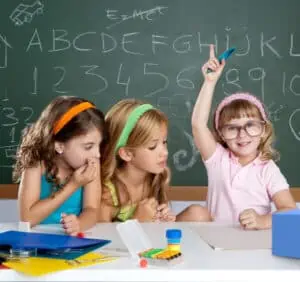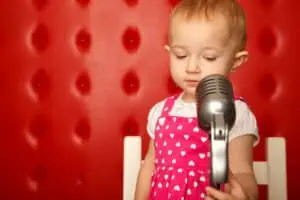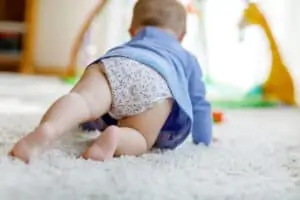As you’re likely already aware if you’ve been reading my blog for a while, I’m an American woman married to a Chinese man. We started our journey living in China and made our way to the US again some years ago. Here’s my pregnancy story in China.
From the start, when we got pregnant with the eldest, we knew we’d have challenges ahead of us with language. We agreed that we’d want to move from China before our baby got through much schooling and that we wanted our child to be able to speak English and Mandarin.
I’d learned from researching things back then and speaking to other interracial/multicultural couples that it may take a little more time for your child to speak when processing two different languages. Language development in a bilingual child will still be in a normal range, but patience is required.
Another solid bit of advice we got was to let my husband and his parents speak to her in Chinese while I talked to her in English. One parent, one language. But my husband couldn’t help but speak English, too, so we decided to let his parents be the primary Chinese speakers.
It all worked out for now. My eldest is quite fluent in Chinese, while her little sister works to match those skills. And both of them have such excellent scores in English and reading that the school has given them multiple awards.
So, if you’re expecting now and you’re in a household where two or more languages are spoken, here’s all you need to know about helping your children thrive while learning all the family languages.
Does speaking two languages to a baby cause confusion?
You would think it might be confusing, but babies are not confused by different languages. They are very perceptive creatures even for being so small. They learn the difference between inflections to know when it’s a question or a response, when someone is being kind or rude, and so on.
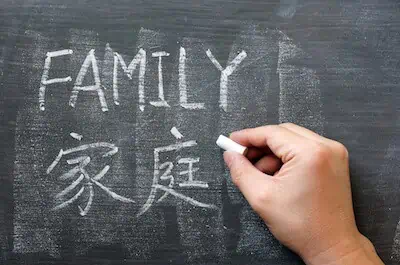
And they learn the difference between languages in this fashion as well. They thought that exposing kids to two different languages set them back a long time ago, but now we know that’s not true. In fact, it can help them think more flexibly. Plus, they will have greater skills when they go into the working world if they can speak different languages besides English.
This can make them slightly slow in language development compared to kids who only speak one language (more on that in a moment). But they will speak and excel at it, count on it!
However,
When a sibling comes into the picture, it can throw things a little off balance. We noticed this too. Our eldest would speak to her little sister in English. It didn’t help that we moved to America soon after this, and now the balance was thrown further off by not hearing as much Chinese.
Do bilingual babies start to talk later?
It was such a slight delay that we barely noticed it. But bilingual children say the first words a little later than kids who only hear one language. My eldest said her first word (which was “mama”) at 8 months old. The normal range here is between 8 and 15 months, so as your child soaks up both languages, be patient. If things aren’t progressing as you near 15 months, you’ll want to speak to your pediatrician.
Generally speaking, most bilingual children will say their first words by the time they hit their first birthday. As long as all other development is on track, this shouldn’t be a concern, but you can always bring it up at checkups with the doctor.
By the age of 2, your bilingual child will be able to use two-word phrases in either of the languages they know. They may even mix grammar rules or combine words from both languages. In case of speech delay, here are some insights.
As an adult that speaks multiple languages, I can tell you I do this myself when I can’t think of a word in Chinese. I pop it into the sentence in English. For children, in particular, it’s normal.
Another typical thing is that some bilingual kids may not talk much when they start a second language, making it a silent period of sorts. But don’t worry about this either because it’s really normal too and will fade out as time goes on.
What is the best way to raise a bilingual child?
Some say that one parent one language is the best method for raising bilingual kids. This simply means what I said before – I spoke English while my husband spoke Mandarin. It’s an excellent method, but things can certainly go awry.
Because I often felt overwhelmed by Mandarin everywhere except in rare circumstances, my husband would speak to me in English. And he’d do so in front of the kids. So we relied more heavily on his parents to speak in Mandarin as well as all the other relatives.
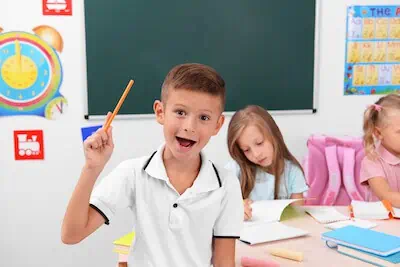
We’d often go out into the world, too, and then the kids would be exposed to more Mandarin. So, if this is what’s going on in your home, make sure they’re getting that exposure to the other language in other ways.
The key is that it needs to be a natural thing. If your kids feel forced into it, or you impose too many rules, it will create a negative connotation.
One thing I have noticed in our home is that English is certainly predominant. And when my husband speaks Chinese to the kids, they sometimes seem reluctant to do so because they’re so used to English. He sits with them each evening to work on Chinese, but I can tell they feel like they’re excluding me, so I try to chime in here and there in Chinese to get them back in the spirit of learning.
Here I have written how to choose the preferred language when parents speak different languages at home.
How to teach a baby two languages at the same time?
When you have two languages in your home, you’re really not teaching your kids to speak them. They come into the languages all on their own by being exposed to them. It’s all input, and the more they are exposed to your languages, the more they will learn.
It’s that natural exposure that I was talking about before, and the best way to help them with two languages is to make them each more accessible.
Here’s how…
- Use both languages from day one
This was easy for us since our daughters were both born in China. Obviously, the hospital staff is going to speak Chinese to us there. From the beginning, both our daughters heard English and Chinese.
And don’t forget, they hear you in the womb too. So they hear all these languages. Talk a lot in both languages even before the baby is born and that will breed familiarity with each one.
- Invest in books
Books are brilliant for any language, but they’re even more important in the languages you speak. In China, we were able to find books that were printed in both English and Mandarin in the same book. So I’d read to my kids in English while my husband would read to them in Chinese.
- Sing songs
When both of my daughters were very small, songs were how we got them to say things in Chinese easily. We’d teach them a little song and dance and watch how delighted their grandparents were.
- Watch bilingual and multicultural shows
One of the best things we found when our eldest was little was a cartoon called Ni Hao Kai-Lan. It was lots of fun and made her feel like she wasn’t the only kid out there learning English and Chinese. There are tons of different shows, videos, and movies for kids that can help you in whatever second language you need.
- Play some games
Even simple play like pretending to cook in the toy kitchen is an opportunity to teach another language in the home. You can narrate the whole experience in your language and soon, they will understand it too.
Sometimes, kids do have trouble using both languages. When this happens, speak to your child in the language you are best with. For me, that’s English. When you have that strong model of your language, it gives your kids the skills they need to learn any other language.
Should a problem with both languages persists, a speech-language pathologist can help. More often than not, though, we just need to be patient, expose our kids to the languages, and let it happen organically.
Leslie Berry lives with her husband and two young daughters in Los Altos, California, where she loves helping other moms get comfortable with motherhood and embracing the insanity with facts peppered with laughs.
She loves eating too much sushi, exercising, and jamming out on her Fender. Read more about Leslie here.



